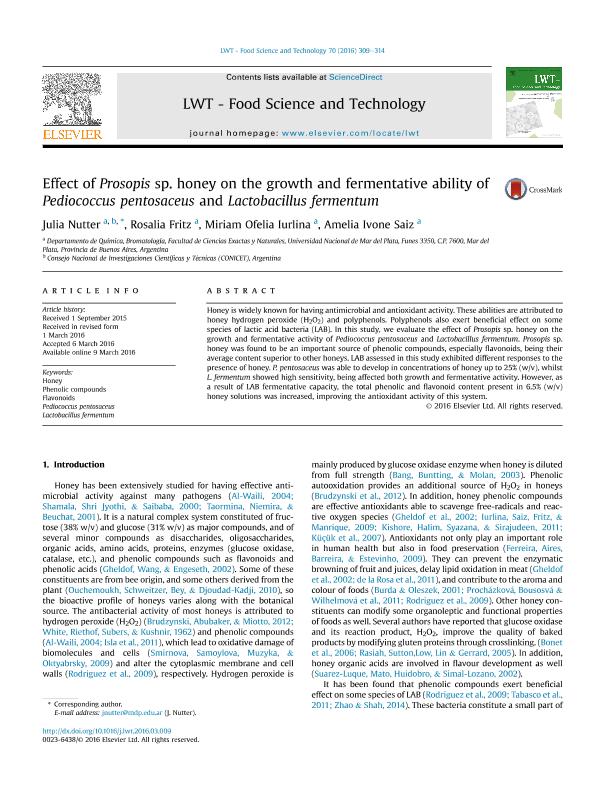Artículo
Effect of Prosopis sp. honey on the growth and fermentative ability of Pediococcus pentosaceus and Lactobacillus fermentum
Fecha de publicación:
07/2016
Editorial:
Elsevier Science
Revista:
LWT - Food Science and Technology
ISSN:
0023-6438
Idioma:
Inglés
Tipo de recurso:
Artículo publicado
Clasificación temática:
Resumen
Honey is widely known for having antimicrobial and antioxidant activity. These abilities are attributed to honey hydrogen peroxide (H2O2) and polyphenols. Polyphenols also exert beneficial effect on some species of lactic acid bacteria (LAB). In this study, we evaluate the effect of Prosopis sp. honey on the growth and fermentative activity of Pediococcus pentosaceus and Lactobacillus fermentum. Prosopis sp. honey was found to be an important source of phenolic compounds, especially flavonoids, being their average content superior to other honeys. LAB assessed in this study exhibited different responses to the presence of honey. P. pentosaceus was able to develop in concentrations of honey up to 25% (w/v), whilst L. fermentum showed high sensitivity, being affected both growth and fermentative activity. However, as a result of LAB fermentative capacity, the total phenolic and flavonoid content present in 6.5% (w/v) honey solutions was increased, improving the antioxidant activity of this system.
Archivos asociados
Licencia
Identificadores
Colecciones
Articulos(CCT - MAR DEL PLATA)
Articulos de CTRO.CIENTIFICO TECNOL.CONICET - MAR DEL PLATA
Articulos de CTRO.CIENTIFICO TECNOL.CONICET - MAR DEL PLATA
Citación
Nutter, Julia; Fritz, Rosalia; Iurlina, Miriam Ofelia; Saiz, Amelia Ivone; Effect of Prosopis sp. honey on the growth and fermentative ability of Pediococcus pentosaceus and Lactobacillus fermentum; Elsevier Science; LWT - Food Science and Technology; 70; 7-2016; 309-314
Compartir
Altmétricas




